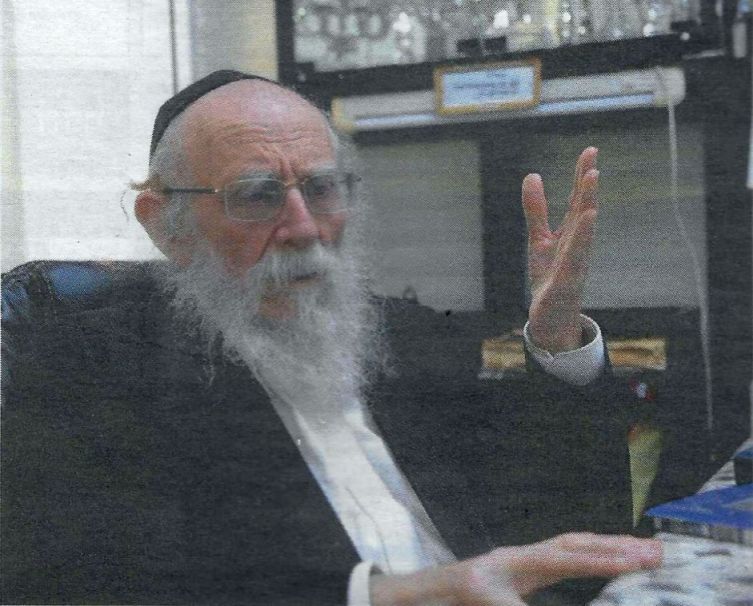HaRav Galai

This past Pesach I was reminded of a story told of HaRav Yechezkel Abramsky. We began our shmuess and HaRav Shimon nodded, asking us to tell it. It took place during an address in a shul in London when he said to his audience: "Let us contemplate on what you think when you come here, and what Dovid Hamelech thought when he went to the House of Hashem.
"You surely think that you are doing the greatest mitzvah to Hashem in coming, while Dovid Hamelech said: `As for me, it is with Your greatest kindness that I come to Your House.'
"This is how a Jew must think — that it is a kindness from Hashem that he be able to go and pray and study in a beis knesses."
HaRav Abramsky continued, "Today I paid a hospital visit here in London. Just think to yourselves how many tens and hundreds of people are riveted to their beds without the possibility to move, to get up and visit a shul even once, not even to attend one Mincha service. Is it then not a kindness of Hashem that we can go to shul so easily, as Dovid Hamelech said? We must surely take full advantage of this privilege and possibility."
Last Pesach, we were ensconced in our homes. There were a few minyanim from our porches. How much would we have paid to go to shul and hear the Shir HaShirim! To say Hallel with the congregation! But with the mercy of Hashem, this year and this Pesach, it is possiblĺ
HaRav Galai waxes emotional and says, "Chazal have said in the Mishna Brochos: to thank for the past and cry out for the future. The Mishna says that a gathering of tzaddikim is good for them and good for the world. For them — that is self-explanatory. When tzaddikim get together, they discuss divrei Torah and much chizuk derives from it. But why is such a gathering good for the world as well?
"Let us explain. When Yitzchok Avinu blessed Yaakov without knowing who he is, he said: `Behold, the scent of my son is that of the field blessed by Hashem. And may Elokim give you...'
"The Sforno comments that Hashem provides bread for all and gives each one what he needs. Note in Chovos Halevovos how he describes at length how Hashem provides each organ of the body with precisely what it needs.
"But what role does scent have in His giving? He can provide sustenance without a good aroma. Says the Sformo: If we know how to thank for every small aspect of what we receive from Hashem, including the good smell that accompanies each thing, then Hashem will `give us` and give us over and over, so much more.'"
The Gemara in Brochos says: "The heavens belong to Hashem while the earth was given to mankind.' Before the blessing, it belongs to Hashem, while after the blessing, it already belongs to man. Hashem showers great bounty upon us.
The Sefer Hachinuch writes that the very purpose of a blessing is so that we be cognizant to thank Hashem for what He gives us and to realize that all the goodness we have comes from Hashem. This will cause Hashem to be able, as it were, to give us more.
This is the reason why a gathering of tzaddikim sitting together and contemplating what takes place in our world and thinking how we must fortify ourselves even more and how we can better draw closer to Him is `good for the world,' for in this merit, the entire world will be blessed with a wonderful bounty.
What `benefit' can we see from the year of Corona?
HaRav Galai gives a parable: When a father strikes a blow to his son, it is for a purpose. How are we to know what he wants?
It depends on the situation which the son finds himself. If he is awake, the father wishes to inflict some pain to remind him that he misbehaved. But if the child is asleep, all he wants is to awaken him.
The Sforno comments that the plagues that Hashem inflicted on Egypt were intended, as the Torah states, "So that they know that I am Hashem.' The Torah says more: "So that I put these signs of Mind in their midst.' How does this apply to us?
Its purpose is to rouse the sleepers. When a person hears about the plagues which the Egyptians suffered, he understands that he, too, must rouse himself.
This past year, we heard the voice of Hashem and we must rouse ourselves! There are so many sick people. Who ever heard about a resuscitator, or Ecmo? Who knows what this is altogether?
When this cell phone is on the table, people are calling in all the time, begging tearfully, "HaRav, pray for us. We are having difficulty in breathing."
Up until now, we took breathing for granted but we suddenly understand what HaRav Abramsky said, "And I, with Your great kindnesó" What great kindness it is that we can breathe. We suddenly acknowledge that breathing is from Hashem!




